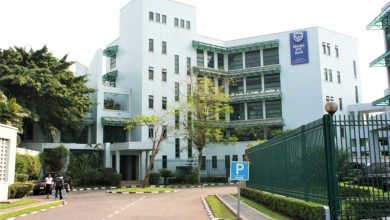Nigeria’s Inflation Falls 32.15% in August 2024:Understanding Shifting Base Effects

The August 2024 Inflation commentary considers:
- Nigeria’s August 2024 Inflation and Key Highlights
- Contrition to August Inflation Across Divisions
- Structural Contribution to Inflation
- Base Effect-CPI Divergence and Implication
- Inflation Across Nigerian Regions and States
- Concluding Thoughts: The Case for Data Integrity
Nigeria’s August 2024 Inflation
Inflation in Nigeria has fallen to its lowest level in over 19 months, driven by the base effect and improved crop harvest season activities. According to the National Bureau of Statistics (NBS) Inflation report, inflation rose year-on-year (Y-o-Y) by 32.15% in August 2024.
This represents the lowest annual inflation rate since January 2023, when it began its 18-month rally, peaking at 34.19% in June 2024. Headline inflation, however, still rallies above the 25.80% reported in August 2023 and the 21% target of the CBN in its orthodox inflation targeting approach. While food inflation decelerated for the second time in over a year, core inflation rose to 27.52% from 27.47% in July 2024 and 21.15% in August 2023 (see Chart 1 below).
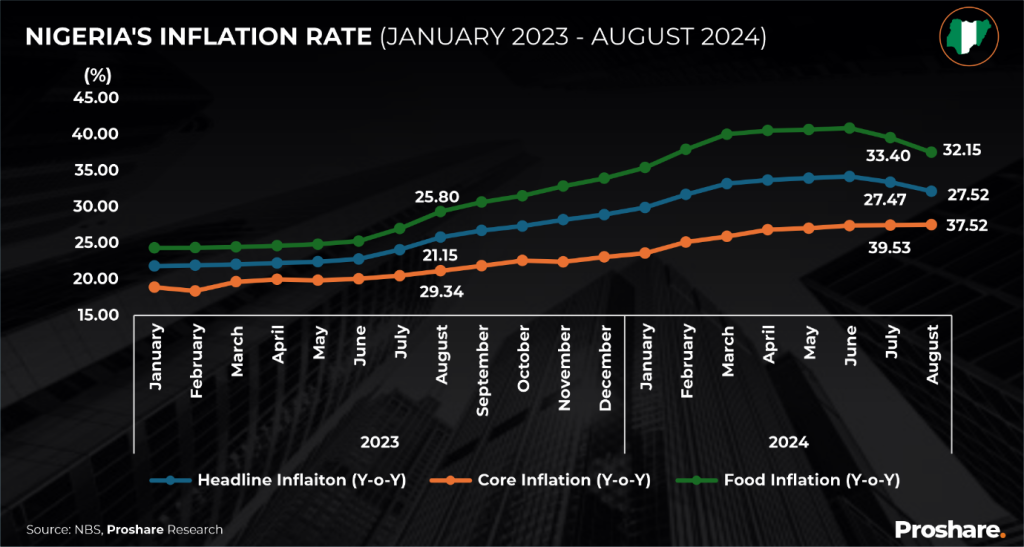
Key Highlights
Headline inflation moderated to 32.15% in August 2024 from 33.40% in July 2024 but represents a 6.35% points growth relative to 25.80% recorded in August 2023.
Moderation in headline inflation was supported by a dip in food inflation to 37.52% in August 2024 from 39.53% in July 2024 but 11.98% points above 29.34% in August 2023.
Lingering structural challenges buoyed Core inflation to 27.58% in August relative to 27.47% in July 2024 and 21.15% in August 2023.
The Northeast region of Nigeria was reported to have the lowest food inflation, at 36.19% in August 2024, down from 38.92% in July 2024.
The Southeast region recorded the lowest headline inflation in August 2024 at 30.69% in August 2024 from 32.84% in July 2024.
South-South topped the ranks food inflation across regions (39.79%) in August 2024.
The Southwest region of Nigeria stood out as the most expensive region in Nigeria in August 2024 with overall inflation at 34.53%.
Similar to July 2024, Sokoto State remains the state with the most expensive food prices (46.98%) while harvest in Benue eases food price growth to 32.33%
For the third consecutive month, Bauchi state records highest overall inflation (46.46%) while easing food price pressures in Benue see it emerge as the state with the lowest overall inflation (25.13%).
Contributions to August Inflation Across Divisions
components such as food and non-alcoholic beverages, energy cost, transportation and clothing and footwear stood among major contributors to inflation growth in August 2024. While volatile, the NBS reports highlight the significant role that food and energy prices play in the overall price levels in the economy (see Chart 2 below).
Chart 2:

Structural Contributions to Inflation
Confirming Proshare’s earlier outlook, persistent structural challenges have limited the gains from lower inflation. This is captured in core inflation growth to 27.58% in August relative to 27.47% in July 2024 and 21.15% in August 2023.
While the depreciation of the naira has served to support foreign trade surplus to N6.94trn (5.19trn) in Q2 2024 (Q1 2024), it has contributed to food inflation with about N2.93trn spent on the importation of food and live animals between January 2024 to June 2024.
Over 6,500 reported abductions across the country between January 2024 and July 2024 (see Chart 3 below)
Chart 3:
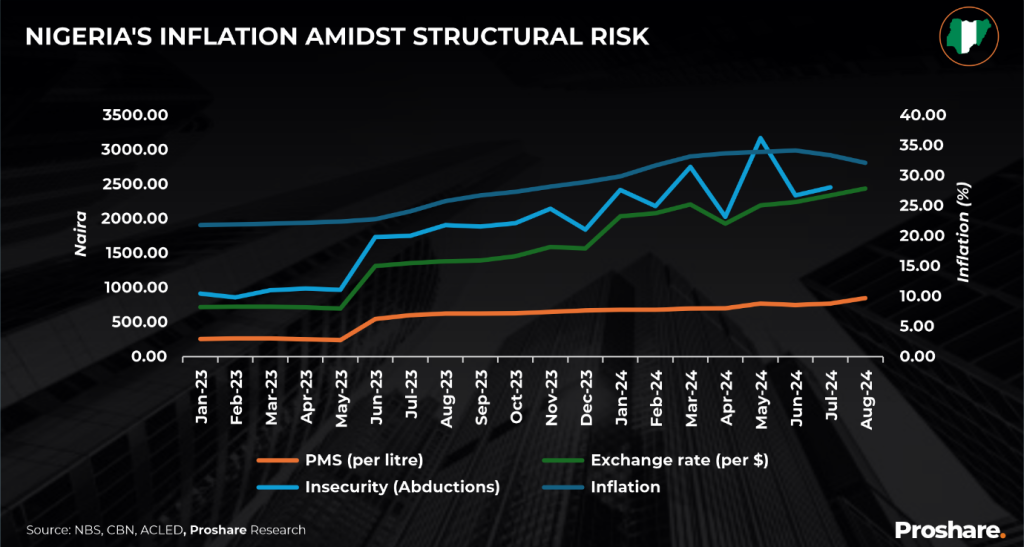
Base Effect-CPI Divergence and Implications
The current level of headline inflation may understate the challenges that households face. Nevertheless, the growing disparity between headline inflation and the CPI could suggest a disconnect between actual economic conditions and the metrics used to gauge household realities (see Chart 4 below).
Chart 4:
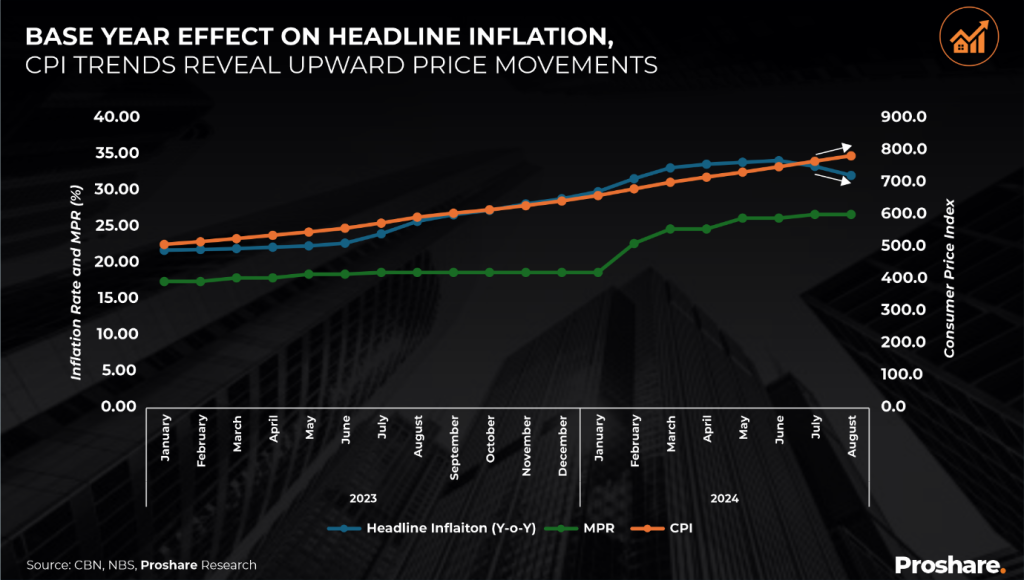
Inflation Across Nigerian Regions and States
Overall, price levels were reported to fall across all regions in August 2024 except in the South-South and Southwest regions, where food prices remained highest (see Chart 5 below).
Chart 5:
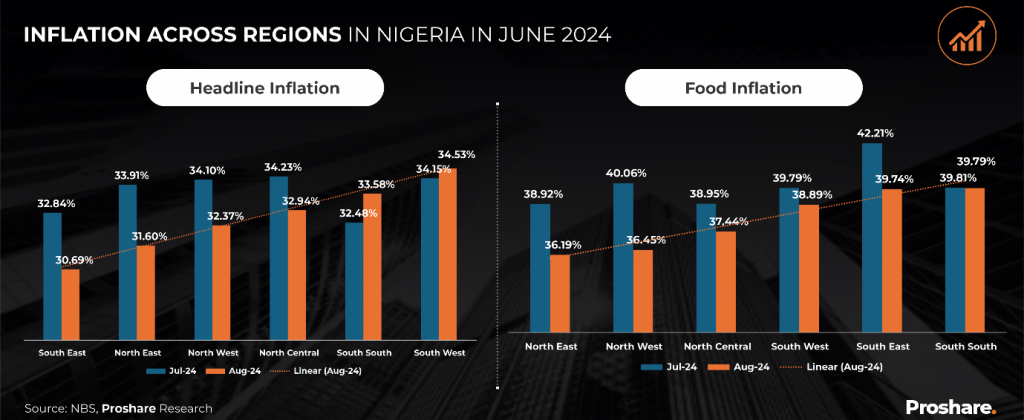
A graph of a bar chart
Description automatically generated with medium confidence
Bauchi state recorded the highest overall inflation (46.46%), remaining at the top of the ranking for the third consecutive month. Only Edo state has previously topped the ranks of states with the highest headline inflation in three straight months between January 2024 – March 2024. Easing food price pressures in Benue see it emerge as the state with the lowest overall inflation (25.13%).
(see chart 6 below).
Chart 6:
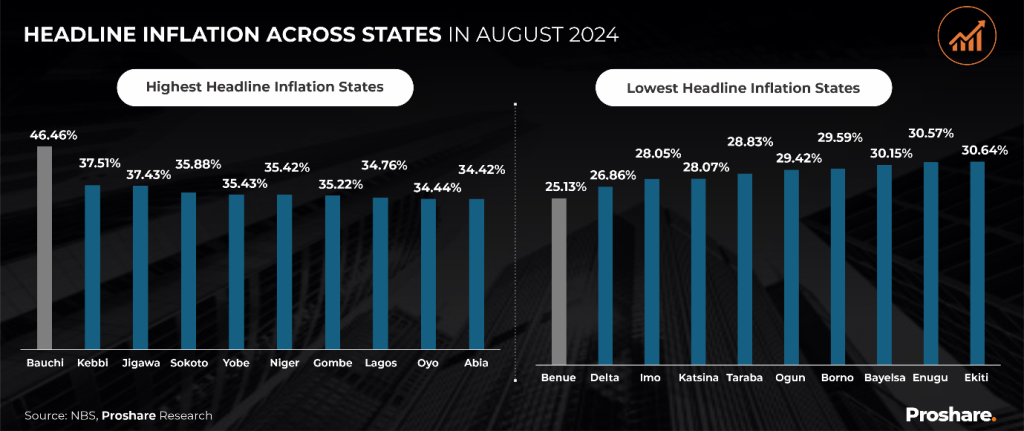
A graph of the united states
Description automatically generated with medium confidence
The Southeast recorded the highest food inflation (53.48%), while the Northeast had the lowest food prices with an inflation growth (38.92%) in July 2024. Northeast states (Bornu, Gombe, and Yobe) and Northwest States (Jigawa, Kebbi, and Sokoto) dominate the rankings of states with the highest inflation driven by the prevalence of insecurity, high input cost, and flood in the northeast, while drought impact on harvest and energy cost dampen food production activities in the Northwest (see Chart 7 below).
Chart 7:
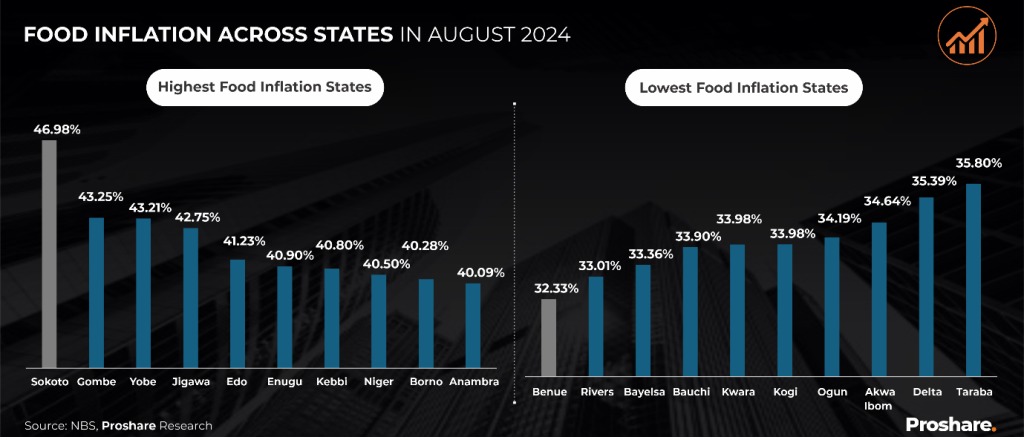
Closing Thoughts
The July and August 2024 inflation rate moderation paints a picture of lower agricultural prices driven by harvest season gains and base year effects in the face of prominent price drivers such as insecurity and PMS scarcity.
Analysts believe the flood alert in 28 states, the PMS price war (hovering above N900/litre), drought in the northeast region, insecurity, and a stable but weak naira relative to the dollar could reverse gains driven by food inflation in coming months.
The Central Bank of Nigeria (CBN) Inflation Expectations Survey (IES) report for August 2024 suggests that businesses and households have high inflationary expectations. Proshare analysts believe inflation may temporarily moderate before reversing (see Chart 8 below).
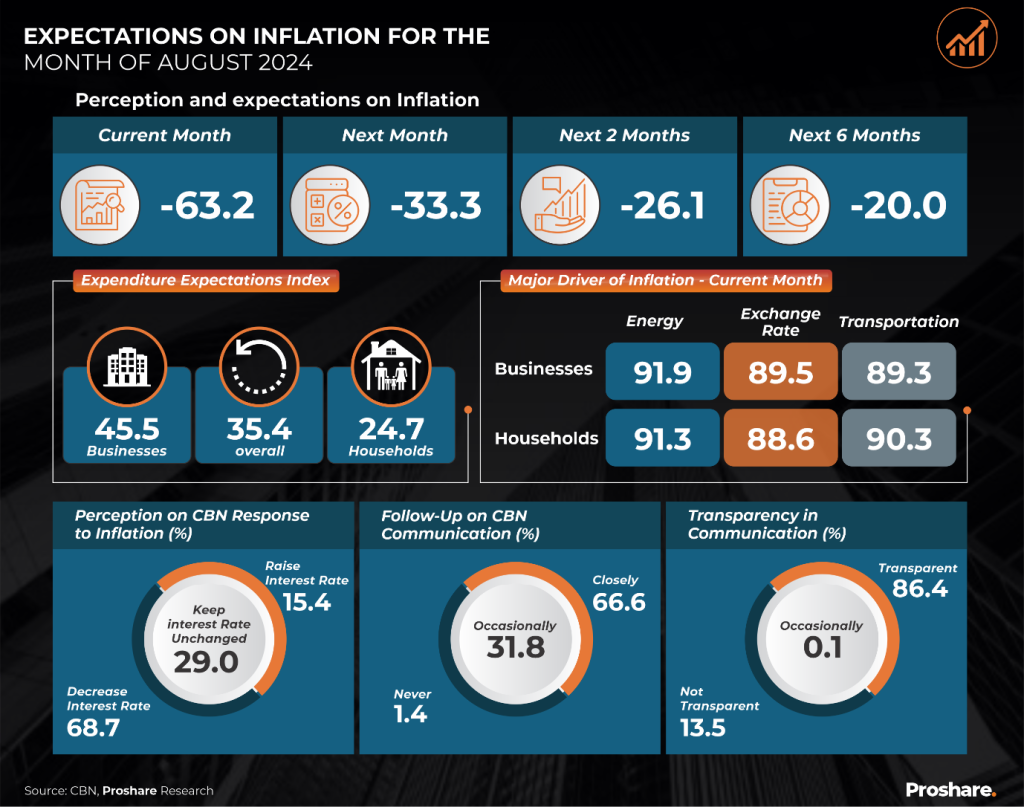
Chart 8:


